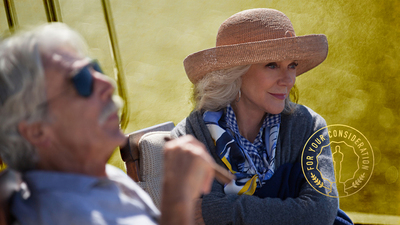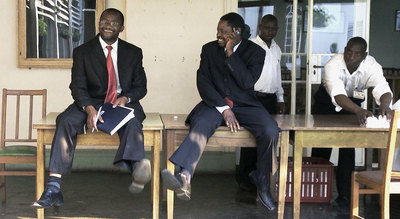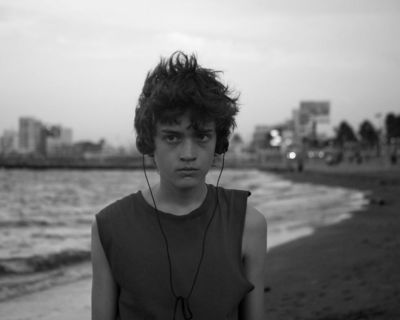
BY MATTHEW ENG |
What It Feels Like For a Girl: MUSTANG Director Deniz Gamze Ergüven on Cinema's Ignorance of the Female Experience
The writer-director of France's official foreign-language Oscar submission discusses her plucky, probing debut.
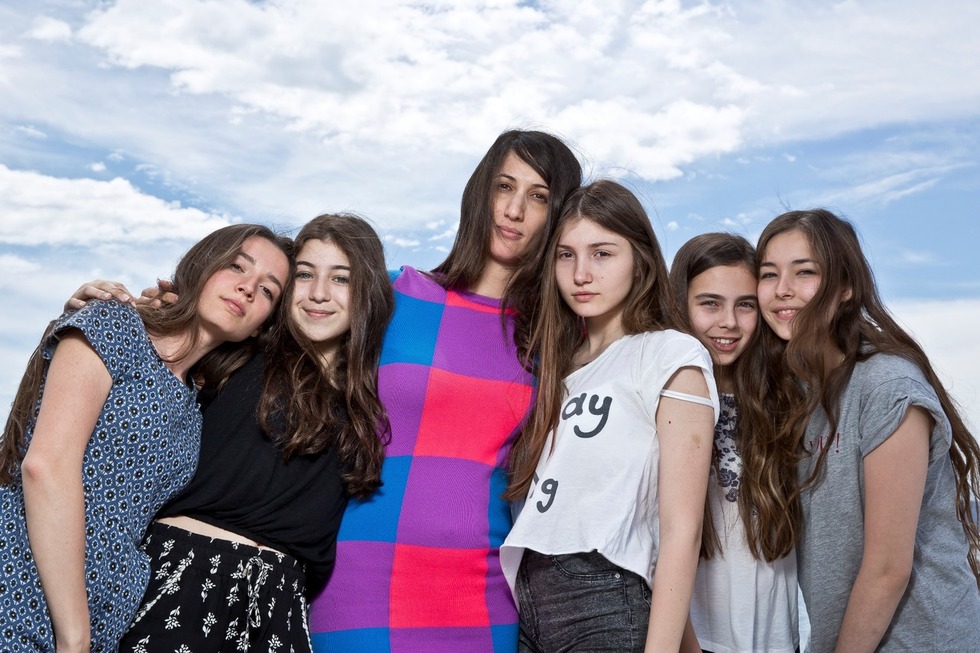
Deniz Gamze Ergüven's directorial debut Mustang is one of the year's most intimately involving films — and one of the most (intentionally) infuriating.
Set in a small Turkish village, this melancholic tale of stunted girlhood vividly immerses itself it in the lives of five orphaned sisters (played by sparkling newcomers Güneş Şensoy, Doğa Doğuşlu, Elit İşcan, Tuğba Sunguroğlu, and İlayda Akdoğan), who are confined to their house one summer by their worried grandmother (Nihal Koldaş) and dour uncle (Ayberk Pekcan). Enclosed by high walls and barred windows, the sisters become prisoners whose only real means of escape is through an arranged marriage or else a move considerably more fatal. Together, they long for impossible access to a freer and unguarded alternative society, relying only on their beautifully implicit sisterly bond to see them through, until that too is shattered by outside patriarchal forces.
I talked to Ergüven, a Turkish-French writer-director who has set the international festival circuit abuzz, about her politically poignant new film, her remarkable band of young actresses, and why the female perspective is still largely unventured cinematic terrain.
Warning: some spoilers to follow.

Mustang features some of the most naturalistic acting I’ve ever seen from young performers. There’s such a stunning intimacy between your five actresses, who have to transition through truly complex and often volatile emotional states over the course of the film while maintaining their impenetrable relationship. How did you put your performers at ease while also making this sisterhood feel as authentic as it does?
You have to create a very, very safe cell in which you work with your actors and it starts from the very first encounter. The girls tell me they were surprised because, for them, in Turkey, the interpretation of a director is very severe, like a director of school who would shout at them. And, for us, it was completely opposite. So it started off by being very friendly, playful. A lot, a lot of discussions. And then complimenting them a lot, you know, making them feel in comfortable territory in some way.
You have to put in a film everything you know about human experience so that it can become very personal. And you know that it’s a sealed pact, that everything you say is just in that spirit. For the girls, the process of auditioning… I didn’t really care if they had acting background. I just had settled on a process of audition where I could see what I was looking for, which were, for me, great properties of acting: great listening, wide imagination, and a capacity, of course, to dive into a situation and stay in it for a long time without trying to act. Because [the sisters] don’t have very specific characteristics, like the “the tomboy” or…
They’re not playing archetypes.
Yeah, they’re not at all archetypes, but they all have their personalities. And there are very specific relations that we had to make exist and sometimes they’re not the most obvious ones. Like, the small one [Şensoy's Lale] is the dominant one.
When we had the five, we started off by engaging in a lot of playful exercises, engaging in eye contact and physical contact. Again, same very, very private things, which of course makes you laugh, cry. The group was always extremely emotional. Plus, now that the shooting is over, I have the impression the girls are spending a lot of time together… [Laughs] Like, we could even do another film together. In the beginning, they weren’t subversive. Of course the characters were a bit like superheroes and no girl would break chairs and say, “These people are assholes!” But, for them, that has become the norm now. [Laughs] So they’re living up to their characters. And it’s almost dangerous. Like, right now, we’re in New York and you see them and it’s like a riot, you know? They’re literally re-doing scenes of the film wherever we go.
I’ve heard you say that your storytelling approach to Mustang is almost similar to a “fairy tale.” It’s not something that I would’ve immediately assumed upon viewing the film, but on reflection, it definitely feels evident in the characterization of Lale, who is really this sort of right-minded heroine who must overcome an impossible force that is preventing her freedom. But I’m more curious to hear you describe what your intent was.
It’s more fragmentary. Like, the relation of film to reality is fragmented. And the trope of the “fairy tale” is fragmented as well. The first treatment I ever wrote [for Mustang] was gloomy reality and it wasn’t necessarily gloomy all the time, but it told secrets which weren’t necessarily mine. It was very up-front. And I really needed to distantiate myself from that in all possible ways to re-appropriate this material. So I needed all the resources that cinema gives you. And it starts off with drama and having characters who are really bigger than life. And then you pull the strings and it becomes a story which is like a tale, literally. And the tropes of fairy tales… once we noticed it was there, it was there everywhere. [Spoilers] For example, Alice, the co-writer, told me, I see [the character of] Ece eat biscuits very mechanically, chewing them one after the other. And the next time I came along with a scene, it had, like, a symbol of what killed Ece and [Lale] spits them out and is like, “The poison biscuits!” [/Spoilers] So, again, because you [tell] yourself you’re in a fairy tale, then you allow yourself that type of writing. And it was already there with the girls on top of the tower of their house and their being orphans…
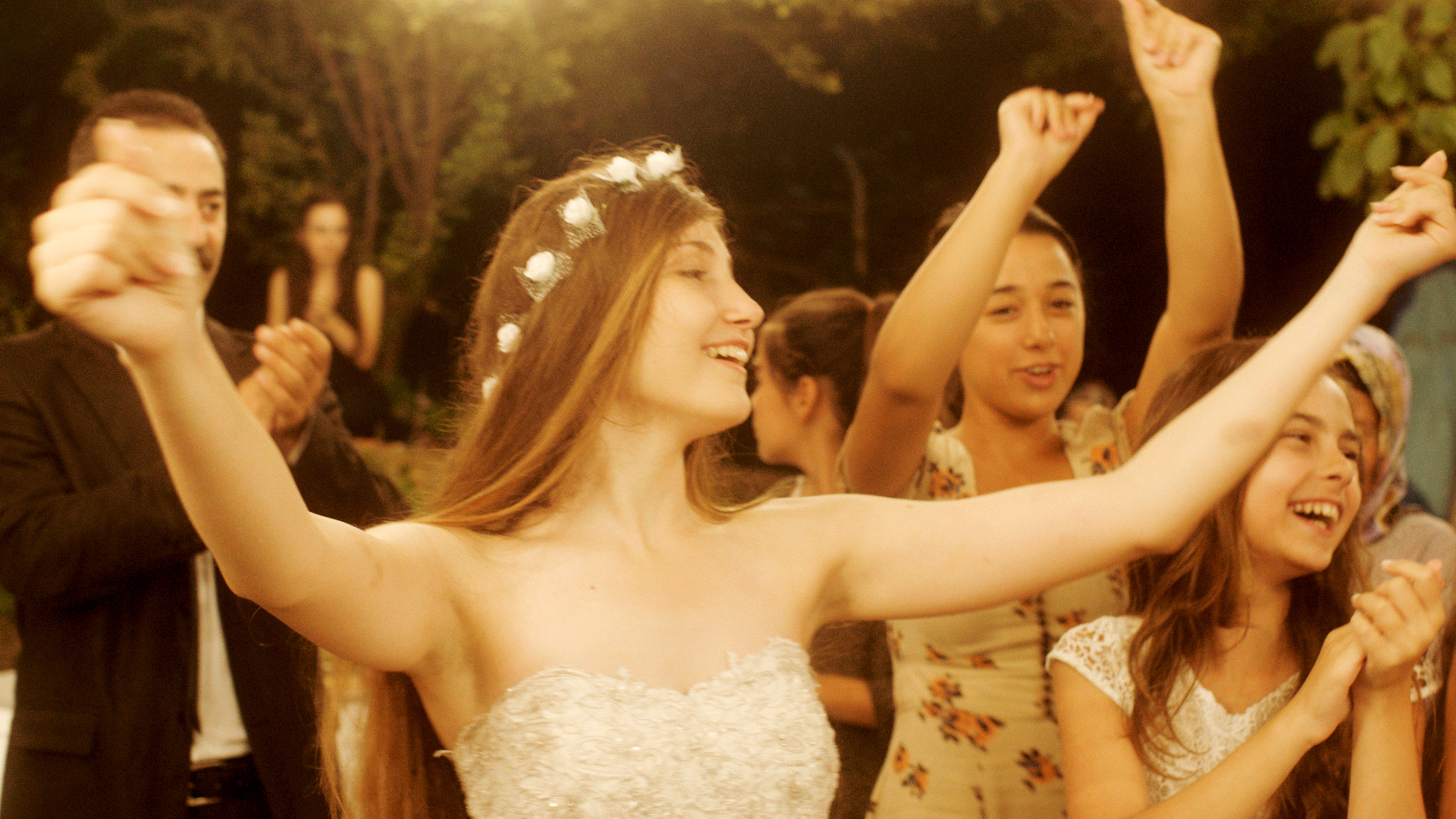
One of the elements that I really admire about Mustang is its humanity, even when it comes to some of the story’s more unfavorable characters. Both Nihal Koldaş’ grandmother and Ayberk Pekcan’s Uncle Erol act questionably, even treacherously, towards the girls. But they’re never purely villainous and their characters never feel anything less than real. How important was it that every single person onscreen feel like a real human being?
I’m happy that you say that because some people, for example, say Erol or the grandmother are just mean, mean, mean characters or bad or evil, and I really don’t feel like that. I feel they have an amount of complexity. The grandmother composes with whatever means she has in her hands to get the girls out of the house. It’s another form of pressure that she is applying on the girls, but she’s doing whatever she can. For me, I projected myself on every one of those characters. I had a lot of empathy for the grandmother, having lost her children, raising five girls, and being completely overwhelmed. I felt sympathetic to her.
And Erol… [Ayberk] sometimes judged his character and I always told him, “You know you can’t do that.” And he’d say, “He’s an asshole!” And an actor is just not allowed to say that about his character. You’re not allowed to do it or you’re gonna do a caricature of him. Erol, for me, was composed of different male figures that I had known and I tried to depict him as maybe something that I hadn’t outgrown so I can’t, like, project myself in him.
I was really affected by the grandmother and Koldaş’ highly-sensitive interpretation of the character, who tows a thin line between being her granddaughters’ occasional defender and being one of their chief captors. In many ways, she’s just as much a victim of this patriarchy as the girls are. How did you originally conceive this character?
There was something about the fact that many women don’t question the rules of a patriarchal society and even reproduce them. There’s a lot of social prejudice. Turkish society is a society which is very much centered on the community more than on individuals. You have a lot of social pressure and so people try to go by the rules. And sometimes, you know, it’s things you have been living with and growing up with and not necessarily [questioning] them. It takes a big jump to break free from those things. That and all the backstory, for me, was very, very explicative of why she was acting the way she was acting. And I know women like that.
Mustang covers some considerably dark territory, especially in its treatment of sexual abuse, which is never actually seen but more frequently implied. How did you find a comfortable balance between acknowledging these developments in the writing, while shielding the younger members of your ensemble from anything too unsettling during production?
First of all, the sexual abuse thing is such a pivot in the film. If you were to separate [the film] into two pillars, one of them is the sexual abuse. It’s so big and all the information of it is just so immense that I don’t think I needed to do anything else but suggest it. And I had to stay in the exact point of view of our main character and see exactly what she sees… It’s unequivocal when you see it. And we feel exactly like the character, like, Did I see what I see? Of course I saw it! From then on, [that] amount of information is the bomb, it’s literally a huge, huge blast in the film, so we don’t need to have more than that.
As for the girls, I didn’t do the completely crazy thing of not talking about it. I did talk about it, but I first talked about it with their parents. And not only about that, but about death as well, the fact that they were gonna face death and all of the other sensitive issues. But the biggest subject was… how do we talk about the physical abuse? And then in the film, it’s nothing. It’s just information. We don’t see anything.
What has the Academy Awards selection and the ongoing festival attention meant to you and to the film? Do you feel like Mustang is reaching more audiences than you ever anticipated?
I didn’t have expectations because I was completely in the doing of the film... The only thing I was really hoping was that the film would go to Cannes. The last short film I had done [2006’s Bir Damla Su, aka A Drop of Water] went to Cannes and I was as proud as a rooster. My mom came and she was so pretty and so happy to have a pretty dress. And, you know, that was that. And then the film had a long festival life and I was happy not to accompany. I traveled a little with it, but it lived its own life and I went on with mine and that was it.
But with Mustang… the producer said, “We show the film on Monday! On Tuesday, we rest!” And I said, “On Thursday, we’re has-beens!” [Laughs] And that was like a joke for me… But that Thursday never came. We’re not has-been yet. It’s going on and on and on.
The film has been sold in many, many different territories. And some where there’s no cultural intersection whatsoever, no historical intersection [between] two countries [who], for one reason or another, have [never] been in contact, like South Korea and Turkey. And people are saying that they feel like it’s their story… And that feels great. And that’s something which is probably bigger than us that I couldn’t have done this in a master plan.
In Turkey, there’s strange mixed reactions to the film. The country is very, very polarized. Everyone is very extreme about the film. The adjectives are so passionate. You either love it or you hate it. And that’s a bit denigrating… it’s a bit upsetting.
Mustang feels both unmistakably feminist in its politics, but also appreciably feminine in its viewpoints and storytelling in a way that is rarely seen or experienced on screen. How do you feel about your films being labeled “feminist” or “female”?
When I was in film school, I was often asked, “Do you think there’s a woman/man cinema?” I didn’t find the pertinence of that question... But [Mustang], I felt, was very, very female because it is about what it is to be a woman. That’s the main subject of the film. So the point of view was very much feminine. I was told the story was very “soft,” but I don’t feel that. Warren Ellis, the composer, told me that it was told in a very soft, feminine way. I can’t define it for you. I’m too much in it to tell you what’s feminine.
But what I [do] find feminine is the fact the femininity is really unexplored territory in terms of art history, in terms of cinema. Women in society have been most of the time represented through the eyes of men. That really does something to the way we articulate our societies as well because, for example, I really feel that a lot of people can’t at all project themselves [as] women. And it’s really a lack of perspective, because we, as women, know how men look. We’ve done that.
There’s something about the female experience that I always compare to New York. When you’re not a New Yorker and you arrive in New York, you have the impression you grew up here because everything is familiar. You know the cabs, the sidewalks, the avenues, the buildings, the architecture, everything. You’ve seen New York in so many films throughout your lifetime. And that’s masculinity for me. And femininity is that place behind the mountain where you have a very bad road and no cameras have been there. And each time, every step of the way of a woman’s life, I’m thinking, Wow, no one ever, ever told me this. And it goes on and on and on about the experience, so we’re living things which are completely unexplored.
So that’s one thing, the pioneer territory. And then the other thing is the fact that women are rarely the subject. They’re the subject of discussion, but they’re not like the subject of action, of desires, of aspiration, and things like that. Most of the time, people just see them as this box, an object of desire, but they don’t project…
There’s this film of [Bertrand] Bonello, this French director who did L’Apollonide [House of Tolerance]. It’s about a brothel and there are these prostitutes. And you really feel that men never, ever think, Does this woman desire me or not? Never. They’re just disposing of an object. And most of them are hairy, old, fat, and not so desirable. And they would never ever generate any kind of empathy with them. Because for them it’s not another subject, it’s an object. So, trying to have empathy with half of humanity is a good bridge.
Mustang is now playing in limited release in select cities.
